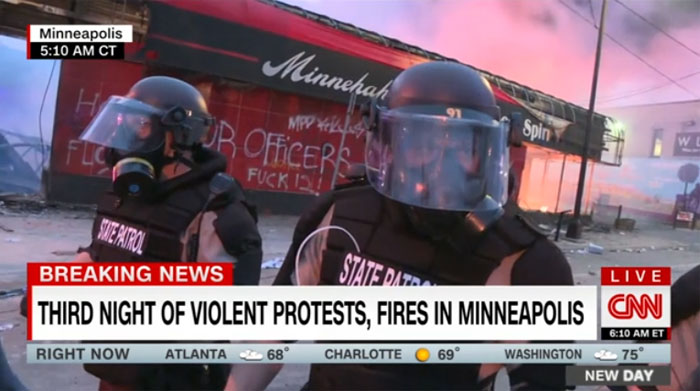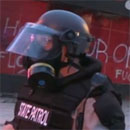CNN crew released from police custody after they were arrested live on air in Minneapolis
CNN
Fri May 29, 2020
Area: Minneapolis, St. Paul
MINNEAPOLIS, Minnesota - A CNN crew was arrested while giving a live television report Friday morning in Minneapolis - and then released about an hour later - as the crew covered ongoing protests over the death in police custody of George Floyd.
State police detained CNN correspondent Omar Jimenez, his producer and his photojournalist shortly after 5 a.m. CT (6 a.m. ET) as Jimenez was reporting live from a street south of downtown, near where a police precinct building was earlier set ablaze.
Jimenez could be seen holding his CNN badge while reporting, identifying himself as a reporter, and telling the officers the crew would move wherever officers needed them to. An officer gripped his arm as Jimenez talked, then put him in handcuffs.
"We can move back to where you like. We are live on the air here. ... Put us back where you want us. We are getting out of your way - wherever you want us (we'll) get out of your way," Jimenez said to police before he was led away.
"We were just getting out of your way when you were advancing through the intersection," Jimenez continued.
Police told the crew they were being detained because they were told to move and didn't, one member of the CNN crew relayed to the network.
Minnesota Gov. Tim Walz told CNN Worldwide President Jeff Zucker that he deeply apologizes for what happened and would work to have the crew released.
Later, after the crew was freed, Walz told reporters: "We have got to ensure that there is a safe spot for journalism to tell the story."
The troopers were clearing the area at Walz's direction, he said, adding there was "absolutely no reason" for the journalists' arrests and that he takes full responsibility.
Jimenez and the others - producer Bill Kirkos and photojournalist Leonel Mendez - had been taken to the city's downtown public safety building after their arrest, but were released after 6 a.m. CT.
Jimenez, after his release, reported live outside from downtown and said he'd been treated cordially after he'd been led away.
"We're doing OK, now. There were a few uneasy moments there," Jimenez said.
The Minneapolis State Patrol said this about the incident:
"In the course of clearing the streets and restoring order at Lake Street and Snelling Avenue, four people were arrested by State Patrol troopers, including three members of a CNN crew. The three were released once they were confirmed to be members of the media."
CNN disputed the state police characterization in a statement on Twitter.
"This is not accurate - our CNN crew identified themselves, on live television, immediately as journalists. We thank Minnesota @GovTimWalz for his swift action this morning to aid in the release of our crew."
Another CNN reporter says he was 'treated much differently'
CNN's Josh Campbell, who also was in the area but not standing with the on-air crew, said he, too, was approached by police, but was allowed to remain.
"I identified myself ... they said, 'OK, you're permitted to be in the area,'" recounted Campbell, who is white. "I was treated much differently than (Jimenez) was."
Jimenez is black and Latino. Kirkos is white, and Mendez is Hispanic.
"A CNN reporter and his production team were arrested this morning in Minneapolis for doing their jobs, despite identifying themselves -- a clear violation of their First Amendment rights. The authorities in Minnesota, including the Governor, must release the three CNN employees immediately," CNN said in a statement shortly after their arrest.
Former Philadelphia police commissioner Charles Ramsey, a CNN law enforcement analyst, said the arrest made no sense.
"State police are going to have a lot to answer for this arrest here," Ramsey said. "(Jimenez is) standing there ... you can see his credential. Just move him where you want to be."
"They should have a designated (media) area, and just tell them to move to that area."
The crew's arrest is a counterpoint, CNN political analyst Bakari Sellers said, to anyone who says, "All you have to do is comply; all you have to do is use your nice inside voice, and the police will leave you alone."
"We have a white reporter on the ground, and we have a brown reporter on the ground. They are a block apart. The brown reporter is arrested and the white reporter is telling us what's happening," Sellers said.
"We saw a reporter who is educated, who is brown, who is doing his job better than anybody ... (who) was in harm's way, letting the American people see what's going on, on the ground. He complied. He said he would move. ... You almost have to laugh not to just be furious."
What happened before the arrest
Hours before the CNN crew's arrest, crowds charged over a fence and threw firecrackers at the Third Precinct building overnight. Minneapolis police officers deserted the building, which eventually was set ablaze.
More fires burned, including at a four-story building that had contained restaurants and an event space down the street from the precinct.
Police appeared to have abandoned the area for hours. Crowds had thinned, though some people still were throwing things into the burning four-story building, Jimenez reported around 4:30 a.m. CT.
Right before 5 a.m. CT, more than 100 state police officers in body armor and riot gear arrived in the area. Firefighters also arrived, spraying water on the burning commercial building.
Intermittently, an officer told people over a loudspeaker to "disperse immediately" or face arrest.
By the time Jimenez was reporting live shortly after 5 a.m. CT, troopers were advancing down the street where Jimenez was standing.
The troopers soon approached the three-person crew while moving in to arrest a fourth person behind them.
After the crew was detained, Mendez's camera was set on the ground and continued to transmit live images.
Journalists assert First Amendment rights to press freedom when covering protests in public spaces, and infringements are relatively rare in the United States.
Numerous journalists were detained while covering protests in Ferguson, Missouri, in 2014. At the time, The American Society of News Editors called it a "top-down effort to restrict" First Amendment rights.
The arrests wound up being embarrassing for the police, and four of the journalists sued St. Louis County. In a settlement deal in 2016, the county agreed "to adopt policy changes that will address the issues raised by this lawsuit."
Since then, researchers at the US Press Freedom Tracker have counted a handful of other cases of journalists taken into custody while covering protests.
See Video here.





 Share your thoughts in the Forum
Share your thoughts in the Forum
